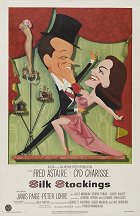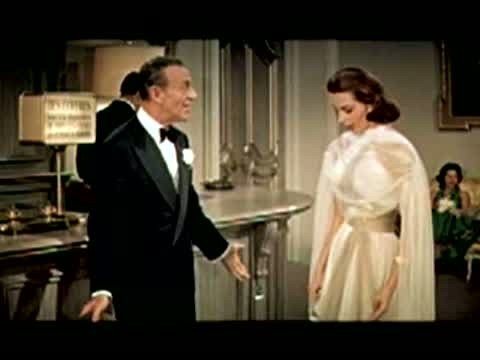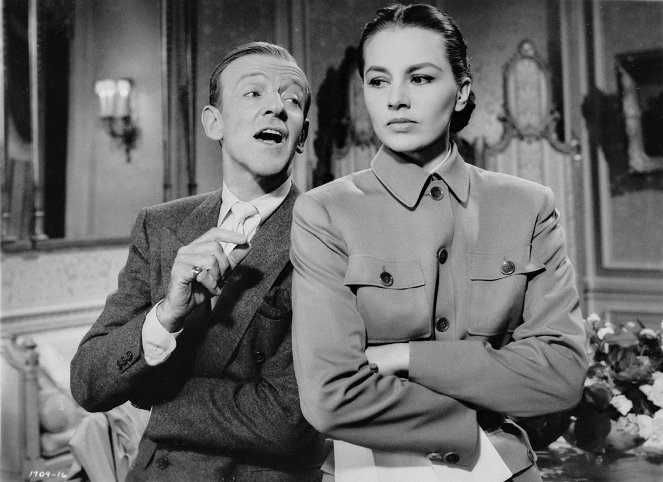Ohjaus:
Rouben MamoulianKuvaus:
Robert J. BronnerSävellys:
Conrad SalingerNäyttelijät:
Fred Astaire, Cyd Charisse, Janis Paige, Peter Lorre, George Tobias, Jules Munshin, Joseph Buloff, Lilyan Chauvin, Rolfe Sedan, Barrie Chase (lisää)Juonikuvaukset(1)
American producer Steve Canfield is in Paris to collaborate with leading Russian composer Peter Ilyitch Boroff on the score for his next picture, when Soviet commissars Brankov, Bibinski and Ivanov attempt to escort the composer back to Russia. To keep Boroff in Paris, Steve contests the composer's Russian citizenship by producing an affidavit disputing his parentage and insists that any conflict must be resolved in court. Despite their initial resistance, the gullible commissars readily accept the position of supervising the American/Russian collaboration when Steve suggests that assignment will win them promotions back in Moscow. As the commissars get settled in their luxurious royal suite, they sing a happy number expressing their "disappointment" about not returning to Moscow. Weeks later, Boroff and the commissars are enjoying the pleasures of Paris when their extended absence causes the Soviet authorities to send one of their staunchest agents to return the men. The soldierly Ninotchka Yoschenko, dressed in uniform gray, meets the commissars in the hotel lobby, where her Communist sensibilities are immediately assaulted by the decadent interior, the amount of servile laborers and hotel advertising, which includes a display of silk stockings. Once in their suite, Steve shows Ninotchka the affidavit, but she insists on meeting Boroff's alleged French father. Steve then tries to charm the stern woman with tales of romantic Paris, but Ninotchka insists that she will not fall for the city's bourgeois propaganda. Later that evening, Hollywood star Peggy Dayton arrives at the hotel, where a throng of reporters interview her about her role in Steve's picture based on War and Peace . Peggy, who once starred in swimming films, clumsily taps her waterlogged ears during the questioning. When the dimwitted actress' replies reveal that she is not prepared for a serious role, Peggy and Steve perform a comedic song and dance number explaining that Technicolor, CinemaScope and stereophonic sound, not acting, sell films. The next morning, Steve escorts Ninotchka on a tour of the city, alternating between her interests in municipal boiler rooms and his flagrant attempts to entice her with shop windows and beauty salons. When they return to his hotel room that evening, Steve sets a romantic mood with low lights and music, but Ninotchka insists that romantic attraction is purely "electro-chemical." After Steve takes her in his arms for a waltz around the room, Ninotchka finally accepts his lead. Once a dancer, Ninotchka's enjoyment builds as the steps become more complicated and then culminate in a kiss. Later, Steve suggests that Peggy use her feminine wiles to seduce Boroff into adapting his music to a popular style. Peggy then invites Boroff to a costume fitting, where she strips while asking him to consider lyrics for his music, effectively pacifying Boroff into accepting the idea. Later that afternoon, Ninotchka, transformed by Steve's attention, locks herself in her room and exchanges her proletarian garments for Parisian lingerie. After luxuriating in the finery of stockings, slips and camisoles, Ninotchka changes into a sexy evening gown and joins Steve for a night on the town. When a giddy Ninotchka returns to the commissars' room at 2:00 am, the commissars confess that Boroff's "Ode to a Tractor" is being transformed into popular music for Steve's film. Contrary to their suspicions, Ninotchka is delighted by the idea and dismisses them. Now alone with Steve, Ninotchka raves about Paris' beauty, convinced that love, not utilitarianism, leads to happiness. The next day, prior to the initial film shoot, Steve suggests to Ninotchka that their meeting was fated and proposes to her. Swept away by their love, the two dance from one stage to another, finally arriving at the film's set. As Peggy begins singing a swinging version of Boroff's music, both Boroff and Ninotchka are insulted by the unrecognizably altered version. Steve defends the transformation, asserting that Americans make popular songs out of classical music for the public to enjoy. A defiant Ninotchka tells Steve that she is neglecting her duty because of her brief emotional attachment to him and decides to return to Russia immediately with Boroff and the commissars. Months later in Russia, Boroff and the commissars, who have been saved from punishment by Ninotchka's favorable report, visit her at her apartment, a room created by curtains, which separate her from several dozen other tenants. Ninotchka shows the men Steve's letter, which has been so censored that only the greetings remain. Soon after, Boroff, now fascinated with "decadent" western music, begins to play his new popular composition on the piano prompting the tenants to pull back their curtains and join Ninotchka and the commissars in a frolicking dance. Meanwhile, Steve devises a scheme in which the commissars are sent to Paris to sell Russian films, knowing that when they overstay their allotted time, Ninotchka will be assigned to retrieve them again. When she arrives in Paris, the commissars whisk Ninotchka away to their new Russian café, where Steve performs a dazzling top hat routine as the first act. The commissars hint that Steve will soon be married and explain that they have deserted the Soviet Union, in favor of sharing their Russian culture through the café. When a disappointed Ninotchka announces that she has no reason to remain in Paris and will return to Russia that night, Steve bursts into the room, revealing that he wrote the anonymous report on the commissars' extended absence in order to get her out of Russia and reminding her of the marriage proposal contained in his letters. Now realizing that Steve created the scheme out of his love for her, Ninotchka rips up her plane ticket and embraces him, while the commissars open another bottle of champagne to celebrate. (jakelijan virallinen teksti)
(lisää)

